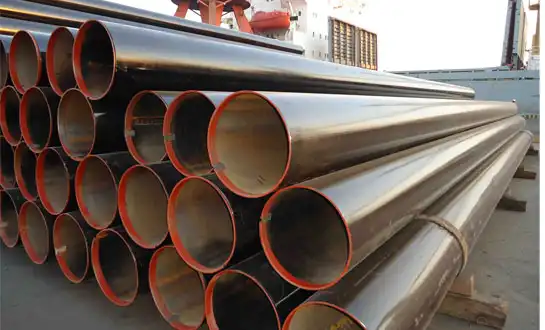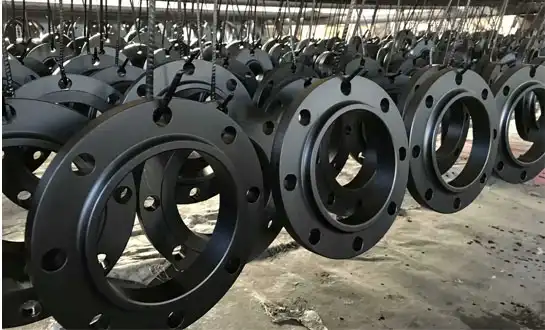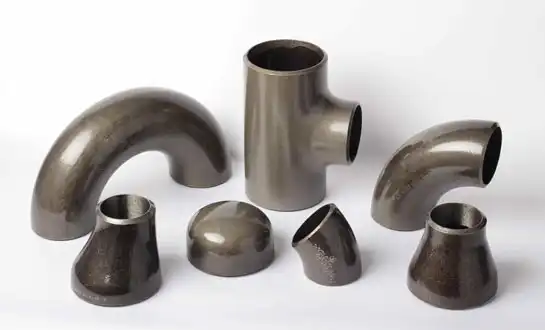The Hidden Costs of Substandard Flanges: Case Studies from Oil Refinery Failures
Oil refinery operations depend on thousands of critical connection points where pipeline integrity can make the difference between safe operation and catastrophic failure. Industrial flanges serve as vital components in these high-pressure, high-temperature environments, yet their importance often becomes apparent only when failures occur. This analysis examines documented refinery incidents where substandard flange quality led to devastating consequences, revealing the true cost of compromising on component reliability. Through detailed case studies spanning operational shutdowns, environmental disasters, and safety incidents, we explore how seemingly minor defects in industrial flanges can cascade into million-dollar losses and irreparable damage to both facilities and reputations.
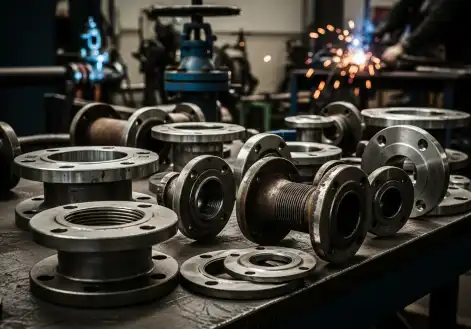
Financial Impact Analysis of Flange Failures in Refinery Operations
Production Loss and Shutdown Costs
Unplanned shutdowns caused by industrial flanges failures represent some of the most expensive incidents in refinery operations, with daily losses often exceeding hundreds of thousands of dollars. The 2019 incident at a major Gulf Coast refinery demonstrates this reality, where a substandard flange connection in the crude distillation unit failed during routine operation, forcing an immediate shutdown of the entire processing train. The resulting production loss totaled 180,000 barrels over eight days, translating to approximately $12 million in lost revenue. Emergency response protocols required additional contractor support, specialized repair equipment, and expedited material procurement, adding another $2.8 million to direct costs. The ripple effect extended to downstream units, affecting product delivery schedules and contract obligations, ultimately resulting in penalty payments exceeding $500,000 to commercial partners.
Emergency Repair and Replacement Expenses
Emergency repairs following industrial flanges failures carry premium costs that far exceed planned maintenance expenses, particularly when specialized materials and expedited delivery are required. A documented case from a Midwest refinery illustrates these hidden costs when a low-grade flange failed in a hydrogen processing unit, causing immediate hydrocarbon release and necessitating emergency isolation procedures. The incident required helicopter transportation of replacement components from a distant supplier, costing $45,000 for logistics alone. Specialized welding crews worked around-the-clock shifts to complete repairs, with overtime labor costs reaching $180,000 for the five-day emergency response. Additional expenses included rental of temporary processing equipment, environmental monitoring services, and regulatory compliance documentation, bringing total emergency costs to $890,000 for what would have been a $15,000 planned replacement using quality industrial flanges.
Insurance and Legal Liability Consequences
Insurance claims and legal settlements following flange-related incidents often dwarf immediate repair costs, creating long-term financial burdens that can persist for years. The Texas City refinery incident involving substandard industrial flanges in a hydrocarbon processing unit resulted in environmental contamination requiring extensive soil remediation and groundwater treatment. Insurance deductibles alone totaled $2.5 million, while the company faced additional premium increases of 40% over subsequent policy periods. Legal settlements with nearby properties that were affected hit $8.7 million. These included claims for property loss, business interruption, and punitive damages. Environmental protection agencies fined the company an extra $1.2 million, and to stop future violations, the company spent $4.5 million on better tracking systems and compliance programs. These examples show that buying cheap industrial flanges can save you money at first, but it can end up costing you hundreds of times more than buying good parts from the start.
Safety Incidents and Environmental Damage from Inferior Flanges
Personnel Injury Cases and Workers' Compensation
Safety incidents involving industrial flanges failures have resulted in severe personnel injuries, creating substantial workers' compensation claims and long-term disability costs for refinery operators. A documented case from a California refinery shows how a defective flange in a high-pressure steam system failed catastrophically, releasing superheated steam that caused third-degree burns to two maintenance workers. The workers' compensation claims totaled $3.2 million over five years, including medical expenses, rehabilitation costs, and permanent disability payments. Additional safety incidents have occurred when emergency shutdown procedures were initiated following flange failures, resulting in slip-and-fall injuries and equipment-related accidents during evacuation procedures. The psychological impact on workforce morale cannot be quantified but significantly affects productivity and employee retention rates. OSHA investigations following these incidents typically result in citations and fines ranging from $125,000 to $500,000, depending on the severity and perceived negligence in component selection and maintenance procedures involving industrial flanges.
Environmental Contamination and Remediation Costs
Environmental damage from industrial flanges failures extends far beyond immediate cleanup costs, often requiring decades-long remediation efforts and ongoing monitoring programs. The Philadelphia refinery incident of 2017 involved multiple flange failures in crude oil processing lines, releasing an estimated 12,000 gallons of petroleum products into surrounding soil and groundwater systems. Initial containment efforts required emergency deployment of specialized environmental contractors, costing $450,000 in the first week alone. Soil excavation and treatment expenses reached $2.3 million, while groundwater remediation systems required installation of permanent monitoring wells and treatment facilities costing an additional $1.8 million. Long-term monitoring requirements mandated by regulatory agencies will continue for 25 years at an annual cost of $180,000, bringing total environmental costs to over $6.8 million. The incident also triggered enhanced inspection requirements for all industrial flanges throughout the facility, requiring significant investment in non-destructive testing equipment and specialized personnel training.
Community Impact and Public Relations Damage
Community relations damage following industrial flanges failures often proves more costly and longer-lasting than direct operational impacts, affecting company reputation and social license to operate. Authorities in Louisiana and environmental groups were very critical of the company after a big flange failed at a refinery in Louisiana, causing emissions and smells that affected nearby neighborhoods. For crisis communication and public relations work, it cost $850,000 over 18 months to hire these companies. Health studies and community outreach programs cost an extra $1.2 million as well. In the affected area, property prices dropped by an average of 8%, which led to a lawsuit seeking $15 million in damages on behalf of all affected parties. For the sake of restoring public trust, the company finally set up a $5 million fund to improve the community and promised to make all industrial flanges meet higher standards. These events show that choices about the quality of a component can have effects that go beyond the facility and may have an ongoing effect on relationships between stakeholders for years to come.
Risk Assessment and Prevention Strategies for Flange-Related Failures
Quality Assurance Protocols and Material Specifications
Putting in place thorough quality control procedures for buying industrial flanges has been shown to be essential for avoiding costly failures and ensuring long-term operating dependability. For all important flange uses, especially in high-pressure and high-temperature service conditions, top refineries now need thorough material certifications, dimensional inspections, and non-destructive testing. As required by ASME and ASTM standards, these procedures include checking the chemical make-up, mechanical properties, and surface finish requirements. Ultrasonic testing and magnetic particle examination are examples of advanced checking methods that can find problems inside a product that can't be seen with the naked eye. To make sure that the quality of the parts is always the same, quality assurance programs also include audits of suppliers, reviews of the production process, and statistical analysis of performance data. These steps raise the starting costs of procurement by about 15 to 20 percent, but they have shown a huge return on investment by getting rid of catastrophic failures and the costs that come with them. Documentation requirements make sure that everything can be tracked from the raw materials to the finished installation. This makes it possible to quickly find the root cause of a problem if it happens.
Predictive Maintenance and Monitoring Systems
Modern predictive maintenance approaches for industrial flanges incorporate advanced monitoring technologies that detect potential failures before catastrophic events occur, significantly reducing operational risks and maintenance costs. Changes in frequency patterns that show bolts or gaskets wearing out can be picked up by vibration analysis tools that keep an eye on flange connections in important situations. Visualizing temperature changes using thermal imaging can show signs of internal leaks or too much friction, and measuring thickness with ultrasonic waves can show how rust is spreading over time. Conditions-based maintenance scheduling is made possible by these monitoring systems. This finds the best times to change parts and reduces the number of unplanned shutdowns. By looking at monitoring data, data analytics tools can guess how much longer something will last and suggest the best times for maintenance based on how it is used and how it has worked in the past. When full monitoring plans are put in place, flange-related failures are usually cut by 85% and average component life is increased by 40%. This saves a lot of money and makes things safer.
Supplier Qualification and Partnership Development
Establishing strategic partnerships with qualified industrial flanges suppliers has emerged as a critical factor in preventing quality-related failures and ensuring reliable component supply chains. Comprehensive seller qualification programs check partners' technical know-how, ability to manufacture, and quality management systems to find those who can meet the refinery's strict needs. Some of the things that are looked at are facility audits, process capability studies, and quality certifications like ISO 9001:2015 and standards specific to the business. Long-term partnership agreements give suppliers guarantees on volume and chances to work together technically, which encourages them to spend in new manufacturing technologies and efforts to improve quality. Joint development programs focus on making custom apps and solutions that deal with specific operating problems in a way that keeps costs low. Performance tracking systems keep an eye on supplier quality metrics, delivery performance, and how quickly technical support responds. This lets things keep getting better and lets problems be found early. These relationships are good for everyone because they lower the cost of buying things, raise the quality of parts, and encourage new technologies to be used in designing and making industrial flanges.
Conclusion
Documented proof from failed oil refineries makes it clear that industrial flanges that aren't up to par cause huge cost rises through lost production, emergency repairs, damage to the environment, and safety incidents. When you choose high-quality parts and use complete prevention plans, you get a big return on your investment because you avoid catastrophic failures and make sure that key applications work reliably.
HEBEI RAYOUNG PIPELINE: Trusted Industrial Flanges Manufacturers
At HEBEI RAYOUNG PIPELINE TECHNOLOGY CO., LTD., we understand that refinery operations cannot afford component failures that threaten safety, environmental compliance, and operational continuity. Our industrial flanges go through strict quality control processes that are backed by GOST-R and SGS certifications. This makes sure that every part meets the exacting standards needed for important uses. As ISO 9001:2015-certified manufacturers, we use advanced metalworking, precise manufacturing, and thorough testing procedures to make flanges that will last for decades. Our experienced engineering team works closely with refinery owners to come up with custom solutions that solve specific operational problems at a low cost. Do not let low-quality parts hurt your facility's image or bottom line. Work with HEBEI RAYOUNG PIPELINE TECHNOLOGY CO., LTD. to get industrial flanges that have been shown to work well when dependability is key. Contact our technical specialists today at info@hb-steel.com to discuss how our premium components can enhance your operational safety and reduce long-term costs.
References
1. American Petroleum Institute. (2023). API RP 571 - Damage Mechanisms Affecting Fixed Equipment in the Refining Industry - Third Edition.
2. Chemical Safety Board. (2022). Investigation Report: Refinery Incidents and Piping Component Failures - Analysis of Root Causes and Prevention Strategies.
3. National Institute for Occupational Safety and Health. (2024). Criteria for Recommended Standard: Occupational Exposure to Petroleum Refinery Process Hazards.
4. International Association of Oil & Gas Producers. (2023). Process Safety - Recommended Practice for Equipment Integrity Management Programs.
5. American Society of Mechanical Engineers. (2022). ASME PCC-1 - Guidelines for Pressure Boundary Bolted Flange Joint Assembly.
6. European Committee for Standardization. (2023). EN 13480-3:2017 - Metallic industrial piping - Design and calculation of pressure equipment failures and risk assessment.

Need a quote? Want to see samples? Just say hello. We’re friendly. We’re fast. And we’re ready when you are.
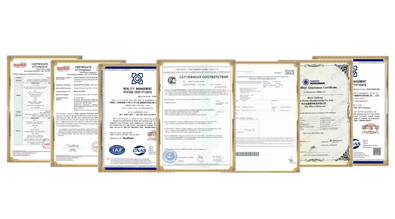
Welcome to RAYOUNG – Strong Pipes, Stronger Promise
